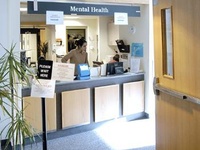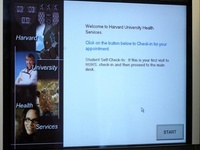Kadison says that UHS does not force students out of therapy, and that the policy has cut down on overuse of services, not prevented students from getting reasonable amounts of treatment.
Previously, some students had up to 150 visits per year—at least three per week, according to Kadison.
“We want to do everything we can for students, but we can’t be a hospital,” he says.
But Robinson says even if UHS does not cut off treatment, the policy might be off-putting to patients with serious mental illnesses.
“I really feel that it is a completely devoid and cheap view of what the obligations of Harvard mental health really are,” Robinson says. “If the system is so overburdened that patients must now fit their therapy into an administrative timeframe, then we must admit as a University that we have a problem—a problem only exacerbated by restricting patient access to the only solution currently available.”
Managing to Care
Kadison estimates that the number of therapy visits to UHS climbed by 1,000 last year.
Few deny that UHS Mental Health Services is overwhelmed.
Located on the fourth floor of Holyoke Center, UHS Mental Health Services sees 1,800 to 1,900 students per year, with a staff of 12 psychiatrists, nine psychologists, six nurse practitioners and 13 social workers.
In its busiest periods, November and December, and March and April, Mental Health Services provides care for around 850 people per week, 80 percent of whom are students and graduate students, Kadison says.
UHS has also increased its mental health staff from 14 full time employees to 20 since 1999, although Kadison says there has been a corresponding increase in visits accompanying every increase in staffing. They have also extended staffing for after-hours urgent care, Kadison says.
The greater cost of providing healthcare is evident in the jumps in Harvard’s student healthcare fee over the past four years. This fee was $745 for the 2000-2001 academic year. This year healthcare cost $1,142.
A 1999 Office of the Provost report pointed to long student wait times and general difficulty in scheduling appointments as major deficiencies of UHS therapy. The report cited the use of UHS services by non-students as one significant factor in the inflexibility students encountered in scheduling appointments.
The report recommended that UHS focus primarily on providing care to students and refer all non-students, including faculty, staff and retirees, out to affiliated clinicians.
Since that report, Kadison says UHS has operated under a policy of referring out faculty and staff and treating students in house “when possible.”
Read more in News
Chapel May Remain in Cambridge Permanently














